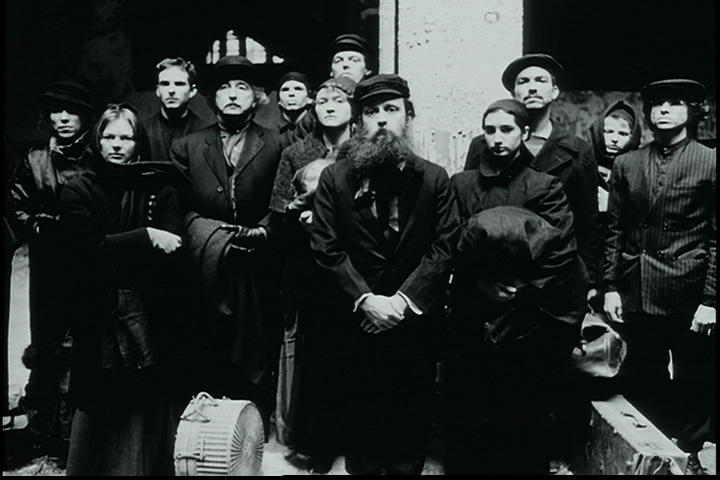Set in the crumbling halls of the contemporary immigrant port, ELLIS ISLAND is a film about the experience of immigrants entering America at the turn of the century. It is not a narrative story but a series of meditative scenes that suggest vintage photographs with ghostly figures juxtaposed against the interior ruins of the former processing center as they undergo humiliating experiences of medical examinations, classifications, and bureaucracy, recreated as bewildering, strange, and poetic scenes.
 Not all immigrants were deemed physically fit to be admitted to the country and the anxiety of waiting hangs heavily in scenes in waiting rooms that give way to moments of nostalgia for their distant familiar cultures and countries, as they perform dances and play games to while away the time. The performers are silent actors who convey feelings and actions solely through movement. Monk’s gentle but haunting music, accompanied by her own voice, adds another dreamy layer to the black and white images lensed by Jerry Pantzer. Interwoven are sequences, shot in color, of modern day hoards of tourists marching through the site.
Not all immigrants were deemed physically fit to be admitted to the country and the anxiety of waiting hangs heavily in scenes in waiting rooms that give way to moments of nostalgia for their distant familiar cultures and countries, as they perform dances and play games to while away the time. The performers are silent actors who convey feelings and actions solely through movement. Monk’s gentle but haunting music, accompanied by her own voice, adds another dreamy layer to the black and white images lensed by Jerry Pantzer. Interwoven are sequences, shot in color, of modern day hoards of tourists marching through the site.
Monk refers to the people in her film as ghosts who serve as a reminder to contemporary Americans of the many heritages that make up who they are as a society today. Despite the indignities the immigrant forebears are shown enduring, she sees something more positive in these individuals: “I sensed the spirits of people still in those rooms. The strength and courage of the human spirit in a situation like that was very moving…”
ELLIS ISLAND was awarded the CINE Golden Eagle, special Jury Prize from the Atlanta and San Francisco Film and Video Festivals, and has been shown on PBS, USA; Channel Four, London: and ZDF, Germany.
MEREDITH MONK is a composer, singer, director/choreographer and creator of new opera, music-theater works, films and installations. One of the most unique and influential artists of our time, she creates works that thrive at the intersection of music and movement, image and object, light and sound, discovering and weaving together new modes of perception. Her groundbreaking exploration of the voice as an instrument, as an eloquent language in and of itself, expands the boundaries of musical composition, creating landscapes of sound that unearth feelings, energies, and memories for which there are no words.
In 1968 Monk founded The House, a company dedicated to an interdisciplinary approach to performance. As a filmmaker, Monk has created several award-winning films including Ellis Island (1981) and her feature, Book of Days (1988), and Quarry (1977) a film version of her 1975-1976 performance piece of the same name, all of which have screened at numerous film festivals worldwide and on PBS.
Her films, installations and drawings have been shown in museums and galleries including Exit Art, Frederieke Taylor Gallery, in two Whitney Biennials, and at the Walker Art Center and are included in the collection at MoMA. Monk’s music and performance work has been presented at major venues throughout the world.
Monk has been a recipient of the MacArthur “Genius” Award, two Guggenheim Fellowships, three “Obies”, and two “Bessie” awards. She was appointed the 2014-15 Richard and Barbara Debs Composer’s Chair at Carnegie Hall, in 2017 received the Dorothy and Lillian Gish Prize, a 2015 National Medal of Arts from President Barack Obama, and many other awards. She holds a slew of honorary Doctor of Arts degrees, most notably from Bard College, Boston Conservatory, The Juilliard School, Mount Holyoke College, the San Francisco Art Institute and the University of the Arts. She is the subject of two recent books of interviews, Conversations with Meredith Monk, by arts critic and Performing Arts Journal editor Bonnie Marranca, and Une voix mystique, by French author Jean-Louis Tallon.